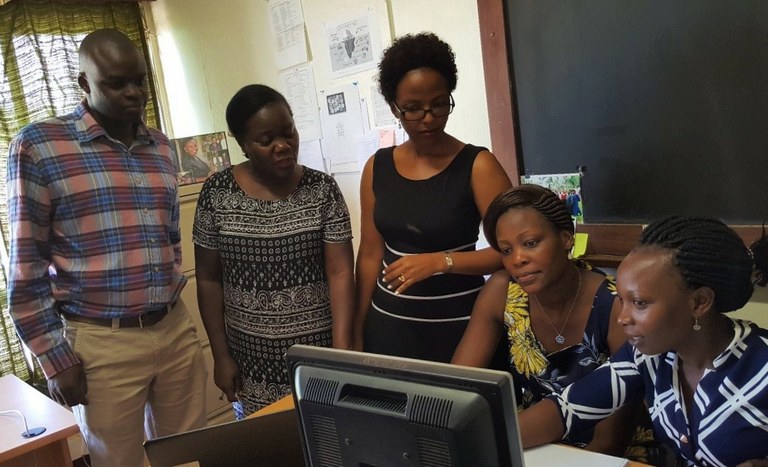Small Grants

Building the evidence base to identify best practices in health and improve health outcomes requires investments in research, as well as use of data. Yet in developing countries, capacity to conduct needed public health research, from both a technical and financial point of view, is overstretched or lacking.
Small grants are one solution to promote research capacity. In line with USAID’s vision of sustainability and the Global Health Initiative (GHI) principles, small grants can support an effective country-led platform by giving local research groups in low- and middle-income countries needed support to investigate local issues.
Building on the experiences and lessons learned from the small grants program under the MEASURE Evaluation Population and Reproductive Health (PRH) Associate Award, MEASURE Evaluation is building local research and evaluation capacity and addressing knowledge gaps in health through its small grants program. MEASURE Evaluation funded 32 small grants as well as providing ongoing one-on-one technical assistance to the sub-grantee teams. Results from these studies from around the world are disseminated directly to stakeholders where the research can inform and influence policies and programs.
Routine health information systems in family planning research funded by the Office of Population and Reproductive Health under MEASURE Evaluation:
Afya Research Africa: Family Planning Services in Kenya during a Transition: Utilization Trends across Counties
Matibabu Foundation: Integrating Family Planning Data in Kenya's DHIS 2
Association for Reproductive and Family Health:
Use of Routine Health Information to Inform Budgetary Allocations for Reproductive Health in Cross River State, Nigeria
Equitable Health Access Initiative: The Strongest Motivators for Using Routine Health Information in Family Planning: A Prospective Study in Lagos, Nigeria
Rivers State of Nigeria Primary Health Care Management Board: Use of Technology to Manage Health Data in Rivers State, Nigeria: A Qualitative Study on Family Planning and Routine Health Information Systems
Health Promotion Tanzania: Enhancing Use of Routine Health Information for Family Planning to Influence Decision Making in Tanzania
Department of Population Studies, Makerere University: Facilitators, Best Practices and Barriers to Integrating Family Planning Data in Uganda’s Health Management Information System
University of the Punjab, Institute of Social and Cultural Studies: Routine Health Information System in Punjab Province, Pakistan: Exploring the Potential for Integrating Health Information Systems for Family Planning Data
Centre of Population, Health and Nutrition Services: Improving Family Planning Service Delivery in Ghana
Access Global Ltd.: Uganda’s Resources to Finance Family Planning Commodities: Implications for a Total Market Approach
Integrated Health Initiative: Integrating Family Planning Data from Public and Private Health Facilities in Malawi: How Current Approaches Align with FP2020 Goals
Governance Links Tanzania: Strengthening Tanzania's Routine Health Information System: Incorporating Family Planning Quality Assessment Indicators
Zambia Association of Gynaecology and Obstetrics, University Teaching Hospital: Adolescent-Friendly Health Services in Public Health Facilities in Lusaka, Zambia
Research and Development Division, Ghana Health Service: Experiences and Perceptions of Health Staff on Applying Information Technology for Health Data Management in Ghana
Indian Institute of Health Management Research (IIHMR): Engendering Evidence-Based Policy for Young People’s Sexual and Reproductive Health in India
International Centre for Diarrhoeal Disease Research, Bangladesh (iccdr,b): Using DHIS 2 Software to Collect Health Data in Bangladesh
The Rescue Initiative – South Sudan (TRI-SS): Analyzing, Interpreting, and Communicating Routine Family Planning Data in South Sudan
Centre of Excellence in Health Monitoring and Evaluation, Mzumbe University: Creating a Culture of Data Use in Tanzania: Assessing Health Providers’ Capacity to Analyze and Use Family Planning Data
Africa Field Epidemiologic Network (AFENET): Family Planning Indicators Assessment and Data Quality Audit in Selected Health Facilities across Nigeria
Supporting an impact evaluation under MEASURE Evaluation with HIV and Bureau-wide funding:
Community Health Promotion Kenya: Evaluating the role of clinical officers in providing reproductive health services in Kenya
International Health and Development Analysis Center: Integrated Community Case Management of Childhood Illnesses: Assessment of Nigeria’s Program
School of Medicine and Pharmacy, State University of Haiti: Implementation analysis of continuous quality improvement initiatives to improve quality of care for people living with HIV/AIDS in health institutions in Haiti
Community-based HIV/AIDS research funded by PEPFAR under the MEASURE Evaluation Tanzania Project:
Institute of Development Studies at the University of Dar es Salaam: Investigating Risky Sexual Behaviours among Youth in the Context of the HIV Epidemic in Mbeya Region, Tanzania
Wambura & Jacque Company Ltd.: Effective linkage from point of HIV testing to care and treatment in Tanga region, Tanzania
Jerusha (T) Limited: How Access to Smartphones Affects HIV Risk among Students in Tanzania: A Case Study of Selected High Schools in the Dar es Salaam Region
Governance Links Tanzania: Women’s Property and Inheritance Rights and HIV in Farming Communities around Lake Victoria, Northwestern Tanzania – A Quantitative Analysis
Development Studies Institute at Sokoine University of Agriculture: How Gender Affects Adherence to Antiretroviral Therapy in Tanzania
Tanzania Health Promotion Support (THPS): Enhancing HIV Retention and Clinical Outcomes in Tanzania through Pediatric- and Adolescent-Friendly Services
Seeds of Hope: Prevention Needs and Priorities among Vulnerable Female Populations Living with HIV
Kilimanjaro Christian Medical Centre - AMO - General School: Feasibility of home-based HIV counselling and testing and linking to HIV services among women delivering at home in Geita, Tanzania: a household longitudinal survey
Mmakija Survey Management: Attrition from HIV Care and Treatment Services in Tanzania: Magnitude and Reasons
Pima Uishi kwa Matumaini (PIUMA): The Children Left Behind: Barriers to Testing and Enrolling Children in HIV Care and Treatment in Njombe Region, Tanzania
Related Content















